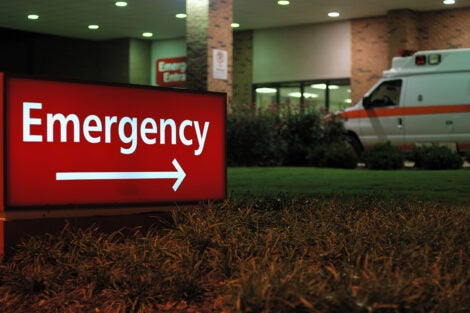March 6, 2024 – The potential financial collapse of Steward Health Care, which owns nine hospitals in Massachusetts, is a crisis—but it could also provide an opportunity, according to health policy expert John McDonough, to make the state’s overall health care system “stronger, better, more patient-centered and community-centered.”
Steward’s financial problems have led to a lack of adequate staffing and supplies in some of its facilities in recent months, in some cases endangering patients, according to media reports. In addition, there are fears that some of the Steward hospitals will close, leaving communities without crucial health care services and placing a burden on the state’s other hospitals.
McDonough, professor of the practice of public health at Harvard T.H. Chan School of Public Health, spoke about the situation in a February 26 episode of “The Codcast,” a podcast produced by CommonWealth Beacon. He was interviewed along with Paul Hattis of the Lown Institute about what went wrong with Steward Health Care, and possible ways to improve the current situation. He and Mattis have also co-authored recent articles about Steward in CommonWealth Beacon.
Steward is a for-profit health care system that was created in 2010, after a private equity firm, Cerberus Capital Management, bought the struggling Caritas Christi hospital chain from the Archdiocese of Boston. Encountering financial difficulties in the succeeding years, Steward wound up selling its Massachusetts properties in 2016, for $1.25 billion, to a real estate firm, Medical Properties Trust (MPT), and has been leasing the properties back from MPT. In the meantime, Steward used some of the profits from the property sale to expand outside Massachusetts. “Steward used its proceeds not to invest in updating its hospitals, but to go out and buy other hospitals,” said McDonough.
Steward’s financial troubles continued, in part, because of the burdensome lease payments to MPT, and in part because surgeries—which had been a reliable source of income for the chain—plummeted during the COVID pandemic. “That was a financial blow to the gut,” said McDonough. “But they might not have suffered as seriously had they not been in hock endlessly.” He added that Steward has been avoiding submitting required financial information to the state over the past several years.
To make matters worse, McDonough noted, Steward CEO Ralph de la Torre has been reaping dividends from Steward as part of the chain’s financial deals, enabling him to own two yachts and two private jets, according to reporting in the Boston Globe. Using money gleaned from the struggling hospital chain “is just reprehensible behavior,” McDonough said.
McDonough said he would like to see Massachusetts leaders step up oversight of Steward. He also recommended that they push for Steward’s exit from the state, and that they pursue a scenario in which existing non-profit community hospitals take over some of Steward’s ailing facilities. The goal, he said, is to ensure that the top priority is advancing public health, not making profits.
Listen to McDonough on “The Codcast”: Steward: A cautionary tale complete with a Snidely Whiplash
Read a February 26 CommonWealth Beacon article by McDonough and Hattis: The state’s options with Steward on the brink
Read a January 23 CommonWealth Beacon article by McDonough and Hattis: Some thoughts on how to deal with the Steward situation
Learn more
Possible Steward hospital closures in Massachusetts prompt concern (Harvard Chan School news)
